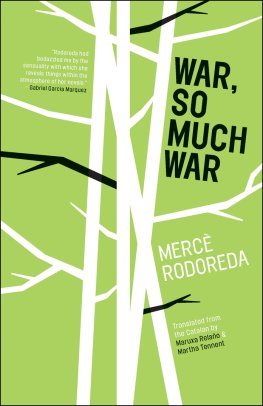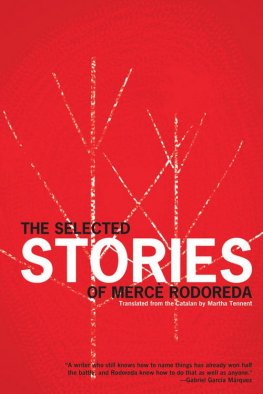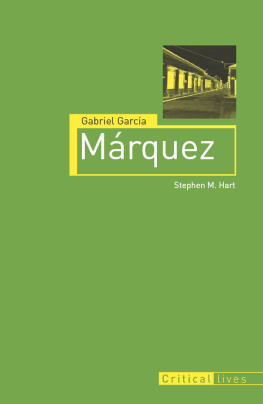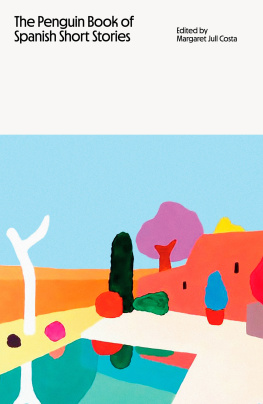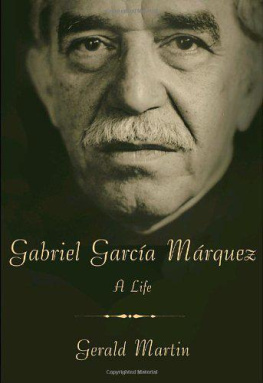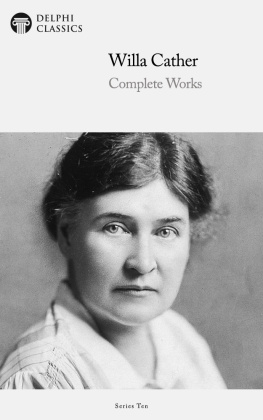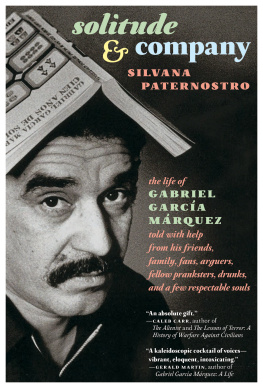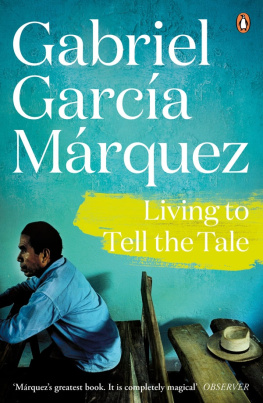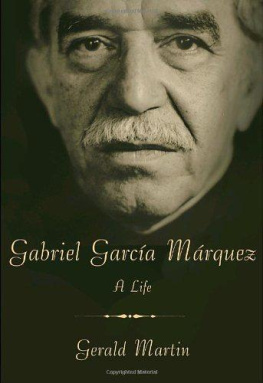Merc Rodoreda
War, So Much War
The sleep of reason produces monsters.
Francisco de Goya
What makes me take this trip to Africa? There is no explanation.
Saul Bellow
A great ravel of flights from nothing to nothing.
D. H. Lawrence
I WAS BORN AT MIDNIGHT, IN THE AUTUMN OF THE YEAR, WITH A birthmark on my forehead no bigger than a lentil. When I made my mother angry, she would stand with her back to me and say, you remind me of Cain. Josep had a scar in the shape of a fish on his left thigh, on the inside; it was funny. Rossend, the son of the junkman who lent us his donkey and wagon to take our carnations to market, had a red-tipped nose that was funny. Ramon, the butchers son, had pointy ears that were funny. I wasnt funny. If they ever teamed up against me to taunt me for not wanting to join in their games, I drove them back by shouting that the Devil was my uncle and he had marked me on the forehead before I was born so he could find me easily, even in the middle of a group of boys. I was as blond as a gold thread. When I was three, everyone mistook me for a girl because Mother had never cut my hair and it fell in ringlets down the sides of my neck. The day Mother took me to see Father Sebasti to have me admitted to school, Father Sebasti gave me a sad look and said: We dont accept girls. Mother lapsed into all manner of explanations. It pained her to cut such beautiful hair; I was too little and would be cold with my hair all chopped off. And while she was explaining, I, who already knew how to write my name, strode to the blackboard, and grasping a piece of chalk, white on black, scribbled in large, crooked letters: Adri Guinart. Father Sebasti noticed at once and, clasping his hands together, exclaimed, A veritable archangel!
I started school with my hair cropped, distressed by the change but wiser than the other boys. Father Sebasti had me sit beside him when he taught Sacred History; my gaze troubled him if I sat on the bench: too much like an owl, he said. We had a thick folder full of large holy pictures that was kept locked in the cupboard where we stored notebooks, pencils, and chalk. While he spoke, I it was always I was supposed to wield a wooden stick to point to the things he mentioned: the Dead Sea, the Staff of Moses, the Tables of the Law, the Tree of the Knowledge of Good and Evil, Adam and Eve wearing fig leaves. Now point to Solomon. I was always mortified when I had to point to the fellow who lost his strength when they cut his hair. Point to the herald angel. Blond, with ringlets like I had before starting school, the blooming lily in his hand, and feathery wings a blue stripe, a red stripe the angel hovered in mid-air before Mary. When it was time for the image of the Great Flood, all the boys in the class, even the sleepiest, most distracted, perked up. As I followed the arching rainbow of colors with the pointer, I could feel myself floating between the green and the purple, the yellow and the pink. . Hadnt Father Sebasti called me an archangel? Archangels flew. Cain and Abel. I held my breath. Abel was grazing his sheep. Cain was sweating and plowing. I was dreaming Sacred History, dreaming angels, dreaming saints, dreaming of myself living Sacred History, crossing deserts and making water flow from springs. On the days when the Crucifixion print was shown, as soon as I reached the field of carnations, I would race from one end to the other, and stand on tiptoes, reaching up as far as I could to hear the stars whispering, poor thing, poor thing, he doesnt have wings. .

The house was ancient, the sink had a terrible stench, the faucet leaked. On windy days the cold crept in through the cracks, but in good weather the smell of flowers permeated every corner. On the Sundays when my father wasnt of a mind to visit his cousins, he would take me for a walk. We spent hours sitting by the side of the road, and sometimes the air winnowed threads from the hearts of stunted flowers, and some would catch in my clothes. It seemed to me that people were all the same: with legs, with thighs, with eyes, mouths, teeth. I walked along, straight as a ninepin, holding the hand of my father who was tall and very good. I dont know why I resented girls; if I ever got my hands on one, I would wring her neck like you would a birds. They exhaust motherly love.

A neighbor who worked in the textile factory had a daughter. One Saturday afternoon she asked my mother to keep the baby. I was anxious: Mother had announced that she had gone to buy me a sister and I would never again be alone; we would have a little girl at home who would laugh and cry. When I asked her why she had bought a girl and not a boy, she simply stated that she had received notice that it would be a girl. That Saturday afternoon my mother said she had to go see somebody about selling the carnations; she told me to keep an eye on the neighbors baby and to be especially careful not to let the cat near her. When Mother left, I went to peep at the sleeping baby and at the cat, which she had shut in the kitchen. The babys name was Mariona; she was pink and had gold earrings. She was lying across two chairs that had been pushed together. I picked her up and put her on the floor. The moan she made took my breath away. I started undressing her the way you would a doll: off with the bodice, off with the panties, off with the swaddling clothes, off with the woolen slippers. I couldnt remove her earrings because I didnt know how to unfasten them. When I had her naked as a little worm, I placed her on a towel and, tugging on it, I dragged her to the edge of the field. She was half awake, and the sunlight roused her completely. I curled up beside her and studied her bare gums and her hair just a few hairs, and very fine. Her eyes were the color of violets, dappled with gold. Intoxicated by the thrill of feeling so old beside she who was so small, I stood up and went to pluck all the violets. Her eyes would be the only violets. In the middle of the field, between two rows of carnations, above the irrigation ditch, I fashioned for her a bed of round, green violet leaves. I carried her there, fearing I might break her, and put her down. She stopped breathing for a moment, and then, all at once, with her mouth wide open, the crying began. I had the urge to take her up to the roof terrace, where the railing was broken, and throw her down. I ran to fetch the cat. I put it down next to her and it sat very still. Look at the cat. . look. . I made her little hand stroke the cats back, but suddenly it wanted loose and jumped on her and scratched her chest. My mother once told someone I dont remember who that when children are left to cry for too long they break. Be still, little girl. I was afraid she might shatter the way a cup does when you drop it. The little girl was covered in blood. Mother whacked me. I wanted to die. I climbed onto the roof of the toolshed and threw myself down. I fell on all fours. I spent all that night, that moonlit night, hurling myself from the shed to the ground. Shortly thereafter, my first little sister was born. And on that night I planted myself. When I had dug a deep hole at the foot of the hazel tree, I climbed in and covered myself with dirt up to my knees. I had taken the watering can with me, and I watered myself. I wanted to grow roots, I wanted to be all branches and leaves.

Mother was from the neighborhood of Sarri in Barcelona, and she had a field of carnations between Sarri and Sant Gervasi, near the train line to Sabadell. I helped in the tasks of watering, taking cuttings, and picking flowers. We worked from sunup to sundown. My father died when I was eleven. He was a train driver. He had a mustache and large, tranquil eyes. When I was little, to get me to sleep he would sit me on his lap and sing me the song about the wheels that go round and round, round and round. He said there was a fiery moon the first time the man appeared on the tracks. A thick fog lay asleep above the trees to the right. And a man was walking right down the middle of the tracks toward the train. As soon as my father saw him, he blew the whistle. The man, who was small at first but started getting bigger, walked on as though there were no train bearing down on him. He got so close my father could see the clothes he was wearing: light-colored trousers and a yellow-and-black striped shirt. My father braked. There was screaming in the compartments. My father got off the train, followed by a group of passengers. They found no one on the tracks. Father had to give the company an account of what had happened to explain why the train was late. Everything would have ended with that if a year later, in the same spot but on a pitch-black night with snowflakes falling calmly from the sky, the man walking along the tracks had not appeared again, in the same attire: pale trousers and a yellow and black shirt. The train was moving at full speed, the wheels singing that song about wheels that go round and round. The minute my father spotted him, he blew the whistle several times, but the stubborn man kept getting closer. Until, finally, his heart pounding, my father was forced to brake. Frightened screams came from the passenger cars. My father got off the train. There was no one on the tracks. Together with some passengers, they scoured the surrounding area. Nothing turned up. My father sensed that the people didnt believe him, that they were eyeing him as though he were crazy. Again, he had to notify the company. If they ever came to suspect that the train driver was seeing visions. . And on a moonlit night, an expanse of silvery fields on either side of the track, the man in pale trousers and striped shirt again appeared in the distance, as he had on the two previous occasions. My father said he closed his eyes. . and did not brake. And with every one of his senses he felt the sound of bones being crushed. The company did not fire him, but he was moved to another line. He operated a dilapidated old train that was as subdued as a turtle and only made short hauls. Plunged into the well of that mystery, he died of a heart attack shortly thereafter. Mother did not weep for him. The carnations were hard work and we had to carry on. The house began to lose its color, as if everything kitchen utensils, furniture, and walls were bathed in a sickly light.

